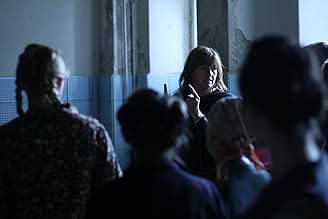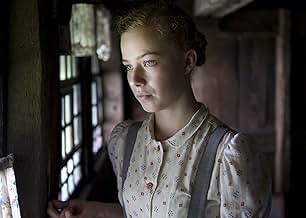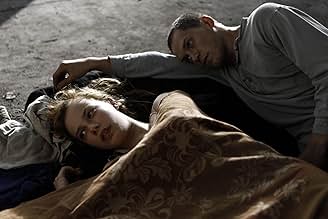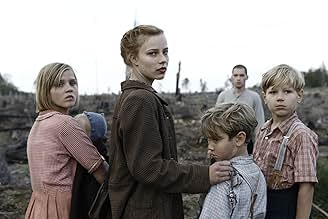PUNTUACIÓN EN IMDb
7,1/10
16 mil
TU PUNTUACIÓN
Mientras los aliados cubren Alemania, Lore lleva a sus hermanos a un viaje que muestra la verdad de las creencias de sus padres. Un encuentro con un refugiado obliga a Lore a confiar en una ... Leer todoMientras los aliados cubren Alemania, Lore lleva a sus hermanos a un viaje que muestra la verdad de las creencias de sus padres. Un encuentro con un refugiado obliga a Lore a confiar en una persona a la que siempre le han enseñado a odiar.Mientras los aliados cubren Alemania, Lore lleva a sus hermanos a un viaje que muestra la verdad de las creencias de sus padres. Un encuentro con un refugiado obliga a Lore a confiar en una persona a la que siempre le han enseñado a odiar.
- Dirección
- Guión
- Reparto principal
- Premios
- 34 premios y 34 nominaciones en total
Kai-Peter Malina
- Thomas
- (as Kai Malina)
Nick Holaschke
- Baby Peter
- (as Nick Leander Holaschke)
Claudia Geisler-Bading
- Ox Cart Woman
- (as Claudia Geisler)
Hanne B. Wolharn
- School House Woman 3
- (as Hanne Wolharn)
Reseñas destacadas
You'd think that, 68 years after the end of the second World War, every perspective would have been covered by the numerous films that have been made about it. But 'Lore' proves that it's still possible to make a movie about an unknown aspect of the war.
In this case, it's the situation in Germany just after the victory of the allied forces. It's a very interesting perspective, because things get turned around. The Nazis are no longer powerful rulers, but hapless losers, afraid to get caught by the Americans. And the Jews, although still despised by most Germans, are the ones who get things done with the allied troops.
The movie shows a country in an almost apocalyptic state, with dead people and destructed buildings everywhere. Citizens can't trust each other and are willing to do anything for some food or transportation. The powers are constantly shifting; an ally can suddenly turn into an enemy.
It's in this utterly destructed and disheartened country that a family without parents is finding its way, led by Lore, a girl of approximately 16 or 17 years old. Her parents, high-ranking Nazis's, have left her to hide from the Americans, and it's up to her to lead her younger sister and three little brothers (of which one is still a baby) to her grandmother in the north of the country. They have to beg for food and shelter, sometimes paying with the jewels her mother left behind.
Australian director Cate Shortland is very good in capturing the mood of desperation and defeat. She uses faded colours, almost like a Polaroid picture, and shows lots of close-ups. Not only of faces, but also of hands, feet, clothes and shoes. It accentuates the oppressive atmosphere in post-war Germany, and the terrible fate of the children. The story gets a twist when the children meet a young man, who for some reason is willing to help them. The relationship between Lore and the young man is ambiguous, for several reasons.
'Lore' is not easy to watch. There are several disturbing and gruesome scenes in the film. But it's a gripping tale of the human urge to survive in almost inhuman circumstances. And most of all, it reminds us of the utter horrors of war. This war, and any war.
In this case, it's the situation in Germany just after the victory of the allied forces. It's a very interesting perspective, because things get turned around. The Nazis are no longer powerful rulers, but hapless losers, afraid to get caught by the Americans. And the Jews, although still despised by most Germans, are the ones who get things done with the allied troops.
The movie shows a country in an almost apocalyptic state, with dead people and destructed buildings everywhere. Citizens can't trust each other and are willing to do anything for some food or transportation. The powers are constantly shifting; an ally can suddenly turn into an enemy.
It's in this utterly destructed and disheartened country that a family without parents is finding its way, led by Lore, a girl of approximately 16 or 17 years old. Her parents, high-ranking Nazis's, have left her to hide from the Americans, and it's up to her to lead her younger sister and three little brothers (of which one is still a baby) to her grandmother in the north of the country. They have to beg for food and shelter, sometimes paying with the jewels her mother left behind.
Australian director Cate Shortland is very good in capturing the mood of desperation and defeat. She uses faded colours, almost like a Polaroid picture, and shows lots of close-ups. Not only of faces, but also of hands, feet, clothes and shoes. It accentuates the oppressive atmosphere in post-war Germany, and the terrible fate of the children. The story gets a twist when the children meet a young man, who for some reason is willing to help them. The relationship between Lore and the young man is ambiguous, for several reasons.
'Lore' is not easy to watch. There are several disturbing and gruesome scenes in the film. But it's a gripping tale of the human urge to survive in almost inhuman circumstances. And most of all, it reminds us of the utter horrors of war. This war, and any war.
The unusual thing about Lore is that, perhaps for the first time, we witness the devastation that Germany itself suffered as a result of World War II. And that was no little thing, something many are not aware or perhaps do not acknowledge.
As for the film, following the end of the war and specially the death of the one many Germans had come to think of as a saviour there is a sense of hopelessness and devastation.
In the family that the focus is placed, the mother has to entrust the safety and wellbeing of her children to her teenage daughter Lore. This mother had to flee for reasons that remained unknown.
What follows is that Lore had to abruptly grow up, without any training or warning and face a battle for survival as she heads to a place of safety. The film therefore is a chronicle of the journey undertaken by 4 children, led by a teenager, from a place of abandonment to a place of safety.
During this journey, they had to face the best and worst of human nature in their encounters with others. Some tried to help, whilst others only cared to take advantage of their predicament. An interesting scene was in the house of a woman who had a framed photo of the Fuhrer and said: Can you believe the lies they said about him? e only wanted to help? The endeavour got even more interesting when their paths crossed with a young Jewish man, who though seemed helpful the young lady in charge had to face a dilemma: In this difficult hour, do we get the help we desperately need from someone willing, or because I was brought up believing he is part of a filthy, inferior people I should just disregard him? The sexual tension between the two is also pivotal for the outcome of this adventure.
Furthermore, it seemed incomprehensible to this young person, how the country of superior people that was meant to lead the world is now occupied and divided into a Russian, American and British zones. He hear somewhere in the film: I am German and this is Germany.
A striking, sensitive film about growing up suddenly, the extreme sides of human nature and where the ultimate battle for survival can lead us to.
As for the film, following the end of the war and specially the death of the one many Germans had come to think of as a saviour there is a sense of hopelessness and devastation.
In the family that the focus is placed, the mother has to entrust the safety and wellbeing of her children to her teenage daughter Lore. This mother had to flee for reasons that remained unknown.
What follows is that Lore had to abruptly grow up, without any training or warning and face a battle for survival as she heads to a place of safety. The film therefore is a chronicle of the journey undertaken by 4 children, led by a teenager, from a place of abandonment to a place of safety.
During this journey, they had to face the best and worst of human nature in their encounters with others. Some tried to help, whilst others only cared to take advantage of their predicament. An interesting scene was in the house of a woman who had a framed photo of the Fuhrer and said: Can you believe the lies they said about him? e only wanted to help? The endeavour got even more interesting when their paths crossed with a young Jewish man, who though seemed helpful the young lady in charge had to face a dilemma: In this difficult hour, do we get the help we desperately need from someone willing, or because I was brought up believing he is part of a filthy, inferior people I should just disregard him? The sexual tension between the two is also pivotal for the outcome of this adventure.
Furthermore, it seemed incomprehensible to this young person, how the country of superior people that was meant to lead the world is now occupied and divided into a Russian, American and British zones. He hear somewhere in the film: I am German and this is Germany.
A striking, sensitive film about growing up suddenly, the extreme sides of human nature and where the ultimate battle for survival can lead us to.
I just saw this film at the Camera Cinema Club in San Jose. This is an immensely complicated film about the children of an SS officer and war criminal. The father disappears. The mother gives herself over to the Americans, and the children (aged 15 down to 7 months) are left to fend for themselves and make a 500km trip to their grandmother's in Hamburg. Germany is in ruins. People are starving and sick. They deny the Holocaust and mourn their dead leader who committed suicide in a bunker. Throughout it all, the 15-year-old lead character Lore must somehow get her siblings to grandma's house while slogging through the chaos of the failed Third Reich.
As I said, it's immensely complicated. It feels like a slice of life even if it is fiction. The cinematography is excellent. The lead actress, all of 19 in real life, is obviously very talented. I gave the film a 7 out of 10 because it's a bit too disjointed for my tastes, but perhaps that's an effective way to portray Germany's disarray at the end of the war.
As I said, it's immensely complicated. It feels like a slice of life even if it is fiction. The cinematography is excellent. The lead actress, all of 19 in real life, is obviously very talented. I gave the film a 7 out of 10 because it's a bit too disjointed for my tastes, but perhaps that's an effective way to portray Germany's disarray at the end of the war.
Lore is an intense drama involving a period of post-WW II German society that is rarely if ever examined and to do it, as this film does, from the viewpoint of German children caught up in these tragic days is worth a visit just out of curiosity. However, this film does not just take a dispassionate look from the viewpoint of historian's or news print, rather because of the wonderful direction of Cate Shortland, this movie moves completely away from ordinary story telling into the far less examined area of psychological change.
Superficially this story is about a family of young children who are forced because of Germany's WW II defeat to make their way from the Black Forrest to their grandmother's home near Hamburg in northern Germany. The story concerns the time before that long journey, the incidents of that journey and finally their arrival at their grandmother's home. Sounds simple and straight forward but the devil, as they say is in the details, or rather the story.
As the story unfolds while the children attempt to reach the grandmother's home, the viewer explores through the eldest, who leads this group, many of the consequences of her past history as a child growing in this family with all the mental baggage implied by this maturation. The drama is carried by this eldest child, Saskia Rosendahl, to whom many of the film's incidents occur.
Moviegoers might be struck by the close-ups used by the director; most of the movie's shots are taken at that range and viewers may not like the method. It contributes to an extremely distinct film, along with the story as well as Rosendahl's superb acting, which must affect the viewer and this after all is why we attend movies to begin.
Superficially this story is about a family of young children who are forced because of Germany's WW II defeat to make their way from the Black Forrest to their grandmother's home near Hamburg in northern Germany. The story concerns the time before that long journey, the incidents of that journey and finally their arrival at their grandmother's home. Sounds simple and straight forward but the devil, as they say is in the details, or rather the story.
As the story unfolds while the children attempt to reach the grandmother's home, the viewer explores through the eldest, who leads this group, many of the consequences of her past history as a child growing in this family with all the mental baggage implied by this maturation. The drama is carried by this eldest child, Saskia Rosendahl, to whom many of the film's incidents occur.
Moviegoers might be struck by the close-ups used by the director; most of the movie's shots are taken at that range and viewers may not like the method. It contributes to an extremely distinct film, along with the story as well as Rosendahl's superb acting, which must affect the viewer and this after all is why we attend movies to begin.
It's a punchline movie.
The ending ties it up well and puts it in proper perspective. Human perspective.
The movie, for me, is largely symbolic, archetypical. Lore is not really a person she IS the immediate post-war Germany.
Everything that she experiences, all her opinions, all the opinions she is exposed to and indoctrinated with, are the points of view of millions of the German populace.
How she deals with it, or denies it is how Germany dealt with and denied it. The 'it' being the entire ethos that permitted/enabled WWII.
In a sense all cultures are a form of mass hysteria, mass hypnotism. Societies indoctrinate as part of their nature, actually part of their definition is the values with which they indoctrinate their populace.
If the values are extreme and violent, the populace often follows. It the society fails at its aims and is physically destroyed, then the population becomes valueless and must die or reinvent itself.
Post WWI German society didn't die, so this is a movie about the pressures, the pressure cooker, in which gave birth to its reinvention.
So, as a piece of symbolic representation, it's magnificent.
There are no plot holes, every bit of dialog, every image, in necessary for understanding.
And patience is required. The viewer assembles all the images, all of Lore's perceptions.
And the pressure cooker cooks.
The ending ties it up well and puts it in proper perspective. Human perspective.
The movie, for me, is largely symbolic, archetypical. Lore is not really a person she IS the immediate post-war Germany.
Everything that she experiences, all her opinions, all the opinions she is exposed to and indoctrinated with, are the points of view of millions of the German populace.
How she deals with it, or denies it is how Germany dealt with and denied it. The 'it' being the entire ethos that permitted/enabled WWII.
In a sense all cultures are a form of mass hysteria, mass hypnotism. Societies indoctrinate as part of their nature, actually part of their definition is the values with which they indoctrinate their populace.
If the values are extreme and violent, the populace often follows. It the society fails at its aims and is physically destroyed, then the population becomes valueless and must die or reinvent itself.
Post WWI German society didn't die, so this is a movie about the pressures, the pressure cooker, in which gave birth to its reinvention.
So, as a piece of symbolic representation, it's magnificent.
There are no plot holes, every bit of dialog, every image, in necessary for understanding.
And patience is required. The viewer assembles all the images, all of Lore's perceptions.
And the pressure cooker cooks.
¿Sabías que...?
- CuriosidadesThe family photographs in the wallet that Lore looks at are pictures of director Cate Shortland's husband's family.
- PifiasThe derelict tank the children pass in the forest is a post-WW2 manufactured Russian T-54/55 or T-62 tank. The balk cross painted on the turret is indicative of an early war paint scheme. Later in the war the 'lines' were thicker.
- ConexionesFeatured in Film '72: Episodio fechado 13 febrero 2013 (2013)
- Banda sonoraJugend will marschieren
(Alte Aufnahme)
Folksong
Arranged by Lisa Carlyna Zumpano (ASCAP)
Published by Audiosparx (ASCAP)
Selecciones populares
Inicia sesión para calificar y añadir a tu lista para recibir recomendaciones personalizadas
- How long is Lore?Con tecnología de Alexa
Detalles
Taquilla
- Presupuesto
- 4.300.000 € (estimación)
- Recaudación en Estados Unidos y Canadá
- 970.325 US$
- Fin de semana de estreno en EE. UU. y Canadá
- 31.498 US$
- 10 feb 2013
- Recaudación en todo el mundo
- 2.362.019 US$
- Duración1 hora 49 minutos
- Color
- Mezcla de sonido
- Relación de aspecto
- 1.85 : 1
Contribuir a esta página
Sugerir un cambio o añadir el contenido que falta




























